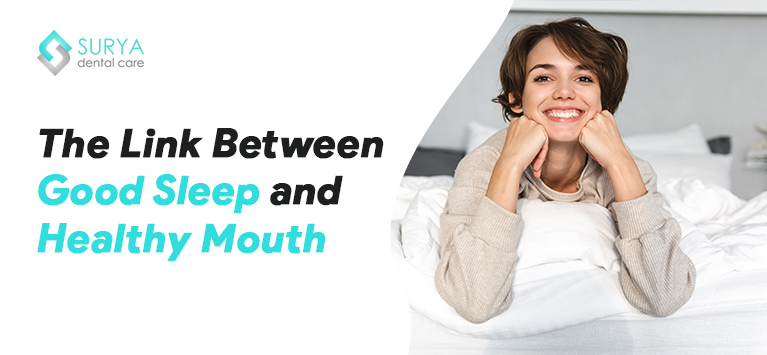Today’s world is full of rush and bustle. As we know, time is a scarce commodity. And, in our daily lives, we are so preoccupied with everything that we don’t have time to sleep. We also know the importance of good sleep to our overall health. But, we must remember its powerful impact on our oral well-being.
The relationship between Good Sleep and Healthy mouth is apparent. But, nowadays, it is sometimes disregarded. Sleep helps the body, brain, and mouth heal at night. This blog post will look at the advantages of getting enough sleep in our mouths. Let’s see the six vital links between them:
How Good Sleep Can Maintain Your Healthy Mouth?
A good night’s sleep guarantees you wake up refreshed and aware. Here, we will talk about six bonds between Good Sleep and Healthy Mouth:
- Energizing Your Oral Defenses
Sleep is your body’s ultimate restorative, vital for your oral defenses. Sleeping allows your body to repair and rebuild. How? The body can eliminate trash from the lymphatic system during this time. This process strengthens the immune system. This robust immune response extends to your mouth, helping prevent potential oral health issues.
Additionally, your body and mouth repair tissues as you sleep. It promotes jaw and other muscle growth. This ensures you wake up energized and ready to face the day ahead.
- Balancing Weight for Oral Health
Surprisingly, the amount of sleep you get affects your weight. It extends to impacting your oral health. According to studies, sleep deprivation increases the chance of becoming obese. Why? Hormone balance related to hunger is upset when one is sleep-deprived. As a result, you are more likely to go for unhealthy snacks. This will lead you to make poor dietary choices that can affect your teeth and gums.
So, getting enough sleep will help you to maintain a healthy body weight. What will it do for you? Maintaining a healthy body weight through sufficient sleep indirectly contributes to a healthier mouth.
- Clearing the Mental Pathway for Oral Well-being
Have you ever had brain fog after a sleepless night? Sleep is necessary for memory processing. Your brain begins organizing and consolidating memories. This happens during your sleep cycle’s third non-rapid eye movement stage, often known as Slow-wave Sleep. The rapid eye movement stage that follows may aid in consolidating these memories. Thus, getting enough sleep can improve your capacity to recall important information.
How does it relate to Oral Health?
Quality sleep builds mental clarity and focus, which are necessary for preserving dental health. Memory consolidation occurs during the slow-wave sleep stage. This stage ensures that you can properly stick to your oral care practices. A rested mind promotes ongoing dental habits that create a healthy mouth.
- Role Of Stress Reduction for a Healthy Mouth
Sleep deprivation can cause anger and stress. People who are stressed may clench or grind their teeth at night. This can lead to dental enamel erosion and jaw pain. Stress also raises cortisol levels, which weakens the immune system. It also makes you more prone to bacterial diseases like gingivitis.
Adequate sleep aids in stress reduction. Stress reduction can have a direct impact on your oral health. As a result, by sleeping better, you can enhance your dental hygiene and health.
- Oral Health and Mood Regulation:
Lack of sleep doubles the chances of mood problems. Mood swings brought on by sleep deprivation can affect your oral health. This leads to additional mental issues. Depression is one of them, and it increases one’s risk of suicide.
A good night’s sleep is an excellent mood stabilizer. Prioritizing rest is a simple yet effective method for maintaining emotional well-being.
- Fortifying Your Oral Defenses
A well-rested body is better prepared to fight ailments. Quality sleep helps to strengthen your body’s immunological response, which includes your mouth cavity. Your immune system creates proteins known as cytokines while you sleep. It is a protein that helps your body fight against oral infections and inflammation. This fortification strengthens your oral defenses.
In short, sleep aids the body’s ability to repair, renew, and recover. This link extends to the oral immune system as well. According to several studies, deep sleep is essential for the body parts to restore itself. Sleeping enough ensures that your immune system remains strong. And it prepares your mouth to face whatever comes your way.
Tips for a Good Night’s Sleep and Healthy Mouth
Sleep hygiene refers to the activities and behaviors that influence the quality and length of sleep. It can involve your bedtime and waking patterns and your food. Physical activity, as well as other everyday activities, also fall under this category. Some suggestions for improving sleep quality include:
- Setting a consistent sleep routine is essential for good sleep and oral health. Every day, even on weekends, one must go to bed and wake up at the same hour. It aids in regulating your body’s internal clock, encouraging a restful condition.
- Avoid large meals, coffee, and alcohol near bedtime. If you consume these, it may disrupt your sleep schedule. In turn, it will impact your oral health. By limiting stimulants, you create an environment that promotes both restfulness and a healthy mouth.
- Maintain a cold, dark, and quiet bedroom. Purchase a good mattress and pillows. It will ensure physical comfort, contributing to a peaceful night’s sleep and indirectly supporting oral well-being.
- Relax before going to bed by doing something relaxing. You can read or have a warm bath for that. These calming rituals help signal to your body that it’s time to wind down. It fosters both quality sleep and a relaxed state for your oral hygiene.
- It would be best if you reduced stress for good sleep. For this, do exercise, therapy, or other means. Reducing stress is critical to a good night’s sleep and maintaining a healthier mouth.
- Blue light can potentially disturb melatonin production, which induces sleep. Thus, try to minimize the screen time. It supports a natural sleep-wake cycle and promotes optimal oral health.
Finishing Up
Prioritizing adequate sleep is more than just feeling refreshed; it is a fundamental investment in your health. Sleep is an essential habit. But, it is an overlooked component of everyone’s oral health and well-being. Follow the given simple yet impactful tips into your routine. These tips will pave the way for restful nights and a healthier mouth.







